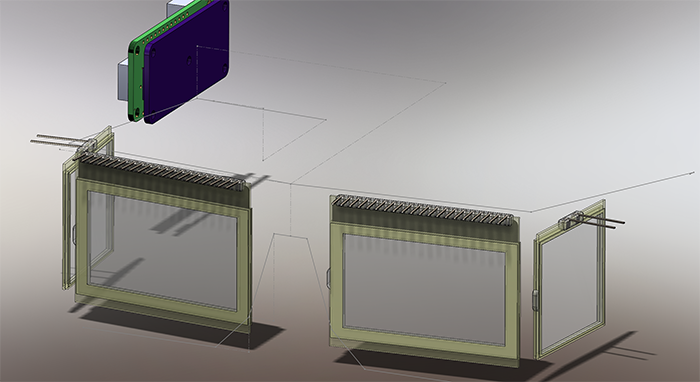The Peril-Sensitive sunglasses of Hitchhiker’s Guide fame directly affect the user’s response to a stimulus, turning completely opaque in response to danger. That’s a great idea, but what if sunglasses could affect your emotions? That’s what the EmotiGlass project in this year’s Hackaday Prize is doing. It’s a concept that allows a computer to change the user’s emotional perception of reality.
The key idea behind the EmotiGlass comes from a paper published by a researcher at the University of London just this year. Apparently, your emotional reaction to an image can be controlled depending on the point in time during your heartbeat cycle the image is presented. For example, researchers found the perception of pain depended on the point in the cardiac cycle the stimulus was delivered.
In an effort to test out this hypothesis with some Open Source hardware, [David Prutchi] and [Jason Meyers] created a pair of sunglasses with liquid crystal lenses that can either be clear or opaque. With the addition of ECG sensors to detect the cardiac cycle and a microcontroller to tie everything together, you get a device that is the emotional equivalent of Peril-Sensitive sunglass.
This is a great project that won $1000 for making it to the finals of the Hackaday Prize, and we’re proud to have this project in the running for the Grand Prize of $50,000 USD.



















I’m just not sure how I feel about this story … it made my heart skip a beat.
After going “This research is BS” when first looking at the page, I decided to look into the mentioned paper to debunk it.
When I reached the project page and looked for the paper, I found it was “Cardiac Afferent Activity Modulates the Expression of Racial Stereotypes”. Then I immediately gave up on trying to look at it and I’ll leave that for someone braver than me. If you want to have the honour, the DOI is 10.1038/NCOMMS13854. And may the gods have mercy on your soul.
Although the connection between baroreceptor firing and emotions may seem at first glance to be weak, well-done research by highly respected academic institutions without industry support does show that there is a very strong correlation as mentioned in the cited reference papers.
Now, having worked in the medical devices industry for decades, especially since I often need to advise if we should invest hundreds of millions of dollars and many years developing a new technology, my BS filters have become very sharp. In spite of that, the baroreceptor-emotion connection passes my smell test very well, and that’s why we decided to develop EmotiGlass.
The relationship between sympathetic arousal and emotions has been known for a very long time and is the basis for a number of medications (or their side-effects). However, it’s only relatively recently that using devices to directly influence sympathetic activation (e.g. through vagus nerve stimulation, or by modulating its branches and/or associated receptors) has started to be exploited as a way of treating disease conditions ranging from depression, heart failure, obesity, and hypertension all the way to controlling autoimmune disorders.
Nevertheless, I’m a firm believer that the “plural of ‘anecdote’ is not ‘data’ “, so only a well-controlled trial would validate whether or not EmotiGlass changes the emotional response of the user in a statistically-significant manner. We did the engineering as a DIY Hackaday project to enable exploration of a completely novel field. We hope that our effort will be useful to someone who may be interested in validating (or disproving) the effect.
Cheers,
David
Some good links to videos regarding the research behind the EmotiGlass concept:
• Sarah N Garfinkel, “Interoceptive Signals from the Heart can Guide Cognitive and Perceptual Experience”, November 2017: https://youtu.be/WqRss1NnEII
• Hugo Critchley, “Interoception, Emotion and Self: How the Heart Gates Feelings and Perceptions”, https://youtu.be/xGqr5buHsXc
• ABC 20/20 segment on lateralized brain stimulation: https://youtu.be/dSq3kkINe10
A YouTube video describing the project is now uploaded at https://youtu.be/4S-CRxxLBgs
Cheers!
David